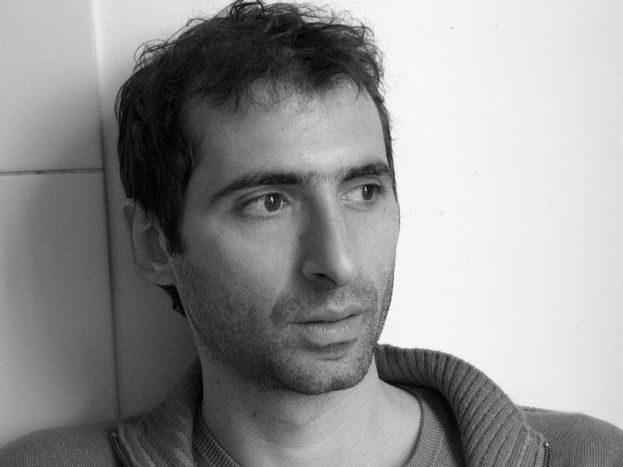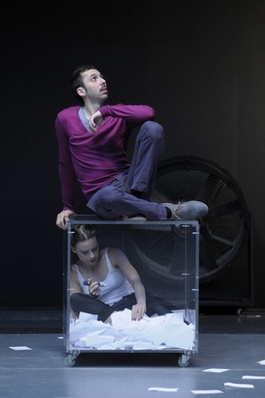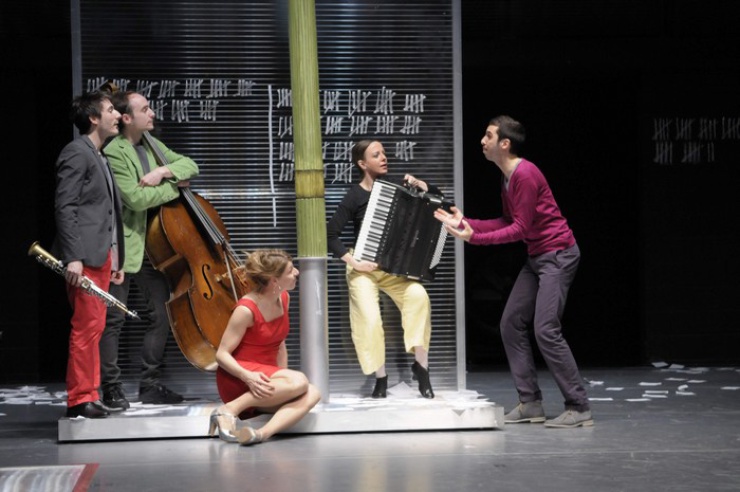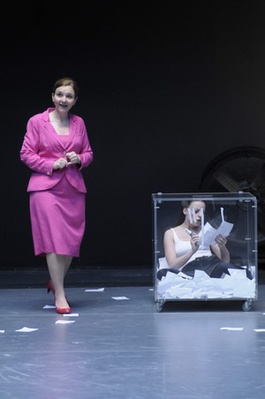
David Lescot: 'Europe is nothing more than a piggy bank for artists'
Published on
Translation by:
 Darren Thompson
Darren Thompson
The fearless French playwright, musician and director, 38, attacks the concept of Europe in his latest show 'L’Européenne', a wacky commentary on a continent that is still seeking to find itself
The actors embrace one another, throw each other around the stage, huddle together and dress themselves up. In David Lescot’s chaotic musical L’Européenne, the protagonists attempt to smooth the rough edges of Brussels’ institutions. The theme of Europe, however, was perhaps not the most glamorous available to the Parisian theatre-going public in September this year. Yet in the cold corridors and compact offices the same problems are faced on a day to day basis: communication and language, election hysteria, the rigidity of the system and the impossibility the tasks heaped on those in Brussels.
Comedy and cacophony
 It was Lescot himself that came up with the idea. 'I had the idea for this show around the time of the referendum on the European constitution in 2005. I was still undecided as to how I would vote. It was then that I noticed the political divide that this subject created. Finally, I realised we were all participating in this collective adventure, an epic, that was carrying us all along ...'
It was Lescot himself that came up with the idea. 'I had the idea for this show around the time of the referendum on the European constitution in 2005. I was still undecided as to how I would vote. It was then that I noticed the political divide that this subject created. Finally, I realised we were all participating in this collective adventure, an epic, that was carrying us all along ...'
After making enquiries and familiarising himself with the institutions, Lescot decided to write a comedy, L’Européenne. 'I felt like I was infiltrating a Realpolitik universe,' he recalls. 'Like a machine that moves forwards hoping to achieve efficiency and without any kind of beauty.' Certain aspects of the institutions were calling out for satirisation, he says, 'those very mechanical and technical elements' especially.
'The more languages there are, the happier I am'
And for those with an ear for music, the twenty-three official languages of the EU are used in the staging of the fantasy. 'The more languages there are,' he explains, 'the happier I am.' The playwright lays his cards on the table from the start of the show, in the form of interpreters hired by the EU. 'We have Latvian to Portuguese, Maltese to Danish, English to Polish interpreters ...'

Using foreign languages also proves complex for the actors. They express themselves primarily in their mother tongues (including Slovenian, Bulgarian and Portuguese) without any subtitling. However, an Italian translator is present to make sure everything is intelligible to the French audience. Like the prisoners of Kafka’s steel castle, the actors portray poets, musicians and music lovers. They also play troublemakers within this somewhat dark European tribe. 'For Europe, giving money to artists is simply adding numbers to a statistics table. And for artists, Europe is nothing more than a piggy bank,' states Lescot. It's basically a collective group of fool. Nevertheless, everything is instrumental as we learn to understand one another, move closer together and finally to attach ourselves to one another.
Born in Naples
 Although David Lescot neglects to mention the future of the European saga in his play, he rejects the idea of creating a single European culture. 'The EU is definitely great when people want to travel between countries, but trying to find a common culture of all the nations is something I fear.' He prefers the term 'miscegenation' ('métissage') instead, as he considers it more captivating. He himself has travelled across Europe thanks to the constantly changing tragicomic shows that develop to reflect today’s harsh reality. It was from there that L’Européenne was born, on the boards of the Napoli theatre in Italy.
Although David Lescot neglects to mention the future of the European saga in his play, he rejects the idea of creating a single European culture. 'The EU is definitely great when people want to travel between countries, but trying to find a common culture of all the nations is something I fear.' He prefers the term 'miscegenation' ('métissage') instead, as he considers it more captivating. He himself has travelled across Europe thanks to the constantly changing tragicomic shows that develop to reflect today’s harsh reality. It was from there that L’Européenne was born, on the boards of the Napoli theatre in Italy.
When it comes to the European year of intercultural dialogue, which was implemented by the EU in 2008, Lescot asks me: 'Did you enter into a dialogue with yourself in 2008?' He sees the symbol as having to 'engrave more and more European cultures in your mind. We are in Europe. But is Europe in us?' Lescot hopes that we can find the answers in his own intellectually amusing works. However, behind the laughter, there is a certain sense of melancholy. In L’Européenne, a dying Jewish grandmother freezes the younger actors, and it is this white-haired, nightgowned character on a stretcher that personifies the resuscitation of the Europe of old. This has provided a way for the playwright to include his own Polish origins in the show and to reflect on those who, like this woman. 'have crossed the sombre ghettos of history. These feelings and memories should not be forgotten as time passes,' concludes Lescot. Utopia continues.
L’Européene will be on the road in Bordeaux between 11-14 November, in Nantes between 23-25 March 2010 and in Limoges between 27-29 April 2010
Translated from David Lescot: «Vous avez dialogué, vous, en 2008 ?»


